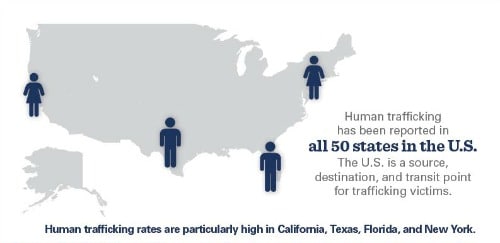#EndTrafficking : Saving Our Children
Worldwide millions and millions of children are victims of child trafficking and forced labor – bought and sold, made to work in grueling, dangerous conditions with little or no pay, and, often, forced into prostitution.
Think it doesn’t impact you? Think again!The food we eat, the coffee, wine or tea we drink, the cotton we wear – are all items that arethe “worst offenders“ that are most commonly produced by child labor or forced labor. There are 128 items on the list and include gold, sugarcane, coal, cotton, rice, tobacco, cocoa, diamonds,garments, coffee, bricks, carpets.
January is Human Trafficking Awareness Month and the US Fund for UNICEF has launched The End Trafficking project to raise awareness and mobilize communities to take meaningful action to protect children. Human trafficking cases have been reported in EVERY state in the US and are particularly high in California, Texas, New York and Florida (Trafficking in Persons Report, 2011).
Connect with UNICEF‘s End Trafficking Project on Twitter to stay up-to-date and informed. Use the hashtag #EndTrafficking to help spread awareness amongst your Twitter community.
Reach out and influence the life of a young girlor boy in your community by volunteering as a tutor ormentor. Get connected to an organization near you at mentoring.org.
Change the conversation by working within yoursocial circles. A “pimp” is not a cool guy, but someonewho abuses and exploits women. A “prostitute” is oftena victim of sexual exploitation. Help your friends rethinktheir choice of language. For tips on how to talk about these issues, visit againstourwill.org.
Switch to Fair Trade brands, and/or host a Fair Trade Party. Fair Trade-certified products are produced without slave or child labor. Profits from Fair Trade products support farmers and laborers involved in production and ensure that they are paid fairly and work under safe conditions. To learn more, visit fairtradeusa.org.
Advocate for state laws addressing human trafficking.Visit polarisproject.org/what-we-do/policy-advocacy/state-policy. Advocate for victims by visitingchange.org’s human trafficking petition page.
The National Human Trafficking Hotline number is 1-888-373-7888.
Callers can report potential cases, get help, or request information and training. This 24/7 toll-free hotline is 100% confidential.
Traffickers have been reported targeting their minor victims through telephone chat-lines, clubs, on the street, through friends, and at malls, as well as using girls to recruit other girls at schools and after-school programs. With the rise of social media use by our children, it is essential that parents, guardians, and concerned adults be vigilant in their lives. Ask questions, have conversations, and be active!
[youtube http://www.youtube.com/watch?v=wVz_PbZyLa8]
This post is brought to you as part of my involvement with The Global Team of 200 – a highly specialized group of Mom Bloggers for Social Good members who focus on maternal health, children, hunger, and women and girls. Meet the team. See our press. Contact us to get involved.


